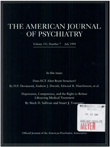Meta-analysis of subjective sensitivity to alcohol in sons of alcoholics
Abstract
OBJECTIVE: Meta-analysis was used to review the research literature on self-reported sensitivity to alcohol among sons of alcoholic and among normal control subjects. METHOD: Computerized and manual searches identified 17 eligible independent articles; nine contained the information necessary to compute effect sizes, and additional data on two other studies were provided by authors in response to written and telephone requests. RESULTS: Findings from 10 studies indicated that sons of alcoholics report significantly less sensitivity to alcohol than normal control subjects overall and during the ascending (i.e., 0- 35 minutes after alcohol) and descending (i.e., 40-240 minutes after alcohol) limbs of the blood alcohol curve. Response to placebo did not significantly distinguish these groups in the five studies that included such assessment. CONCLUSIONS: It may be appropriate to appraise the biological sons of male alcoholics that they may experience less subjective sensitivity to alcohol than other individuals, but it is not possible to predict whether any particular individual will experience such lower sensitivity. In addition, self- report data can be influenced by many factors, and further research that assesses multiple psychological and physiological measures and uses longitudinal designs is needed to determine the relationship between specific factors and the development of alcoholism.
Access content
To read the fulltext, please use one of the options below to sign in or purchase access.- Personal login
- Institutional Login
- Sign in via OpenAthens
- Register for access
-
Please login/register if you wish to pair your device and check access availability.
Not a subscriber?
PsychiatryOnline subscription options offer access to the DSM-5 library, books, journals, CME, and patient resources. This all-in-one virtual library provides psychiatrists and mental health professionals with key resources for diagnosis, treatment, research, and professional development.
Need more help? PsychiatryOnline Customer Service may be reached by emailing [email protected] or by calling 800-368-5777 (in the U.S.) or 703-907-7322 (outside the U.S.).



